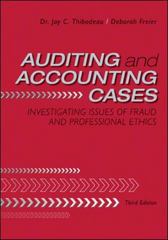To facilitate its growth in communications services revenue, Qwest unveiled an aggressive acquisition strategy in the late
Question:
To facilitate its growth in communications services revenue, Qwest unveiled an aggressive acquisition strategy in the late 1990s. Indeed, after a slew of other acquisitions, Qwest entered into a merger agreement with telecommunications company US West on July 18, 1999. The merger agreement gave US West the option to terminate the agreement if the average price of Qwest stock was below \($22\) per share or the closing price was below \($22\) per share for 20 consecutive trading days. Less than a month after the merger announcement, Qwest’s stock price had dropped from \($34\) to \($26\) per share. So to prevent any further drops in its stock price, executives and managers were allegedly pressured by CEO Nacchio to meet earnings targets to ensure that the price per share did not fall below the level specified in the agreement. Although Qwest’s stock price had dropped from \($34\) to \($26\) per share less than a month after the merger announcement, Qwest stock was trading above \($50\) per share by June 2000; Qwest was, therefore, able to acquire US West by using Qwest’s common stock.
Following the merger, Qwest’s senior management set ambitious targets for revenue and earnings of the merged company.4 These targets were especially ambitious in the face of difficult industry conditions. For example, in Qwest’s earnings release for the second quarter of 2000, on July 19, 2000, Nacchio said that Qwest would “generate compound annual growth rates of 15–17 percent revenue . . . through 2005.” At a January 2001 all-employee meeting, Nacchio stated his philosophy on the importance of meeting targeted revenues:
The most important thing we do is meet our numbers. It’s more important than any individual product, it’s more important than any individual philosophy, it’s more important than any individual cultural change we’re making. We stop everything else when we don’t make the numbers.
By 1999 Qwest encountered several obstacles that challenged its ability to meet its aggressive revenue and earnings targets. It faced increased competition from long distance providers, steep declines in the demand for Internet services, an overcapacity in the market resulting from the formation of other major fiberoptic networks, and a decline in the price at which Qwest could sell its excess fiber-optic capacity.5 Despite these significant industry challenges, Qwest’s senior management publicly claimed that the company would continue its pattern of dramatic revenue increases because of a “flight to quality” that customers would enjoy when they left competitors to use Qwest’s services. Within the company, Qwest senior management exerted extraordinary pressure on subordinate managers and employees to meet or exceed the publicly announced revenue targets. In addition, it paid bonuses to management and employees only for periods when they achieved targeted revenue.
Case Questions
1. Consider the principles, assumptions, and constraints of Generally Accepted Accounting Principles (GAAP). Define the full disclosure principle and explain why it is important to users of financial statements.
2. Explain specifically why Qwest’s failure to disclose the extent of nonrecurring revenue violated the full disclosure principle in this situation.
3. Consult Paragraphs .06–.07 of AU Section 319. Do you believe that Qwest had established an effective system of internal control over financial reporting related to the presentation and disclosure of its nonrecurring revenue? Why or why not?
4. Define what is meant by control environment. Why does the “tone at the top” have such an important effect on internal control over financial reporting? Based on the case information, do you believe that the proper “tone at the top” was established at Qwest? Why or why not?
5. What is the auditor’s responsibility related to information disclosed by management at the time of an earnings release, if any? What is the auditor’s responsibility related to the information disclosed by management in the management’s discussion and analysis section, if any? Do you agree with these responsibilities? Why or why not?
6. Do you believe it is ethical for a CEO to establish a company’s earnings expectation at an unreasonably high number and then require the company’s employees to meet or exceed that expectation to keep their jobs?
Why or why not?
Step by Step Answer:

Auditing And Accounting Cases Investigating Issues Of Fraud And Professional Ethics
ISBN: 9780078110818
3rd Edition
Authors: Jay Thibodeau, Deborah Freier





